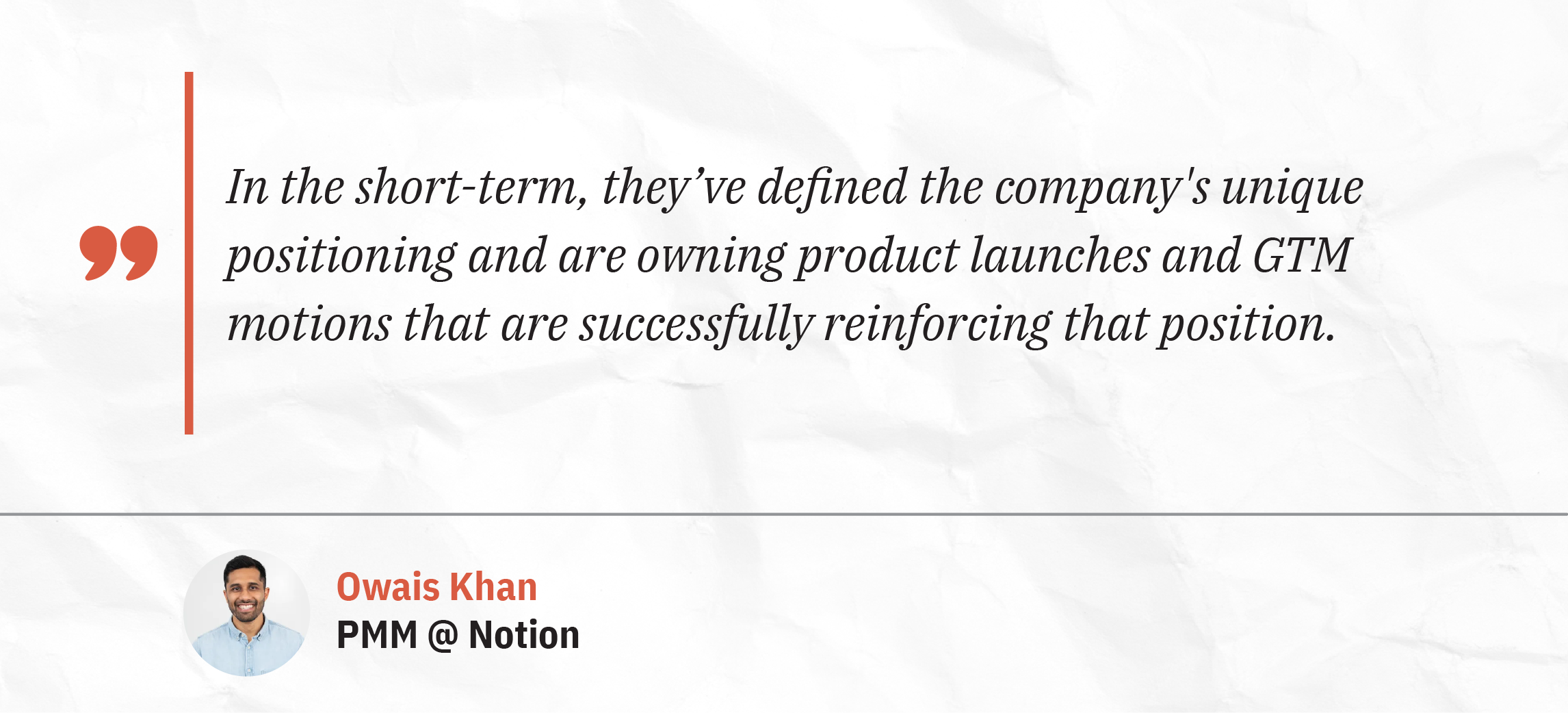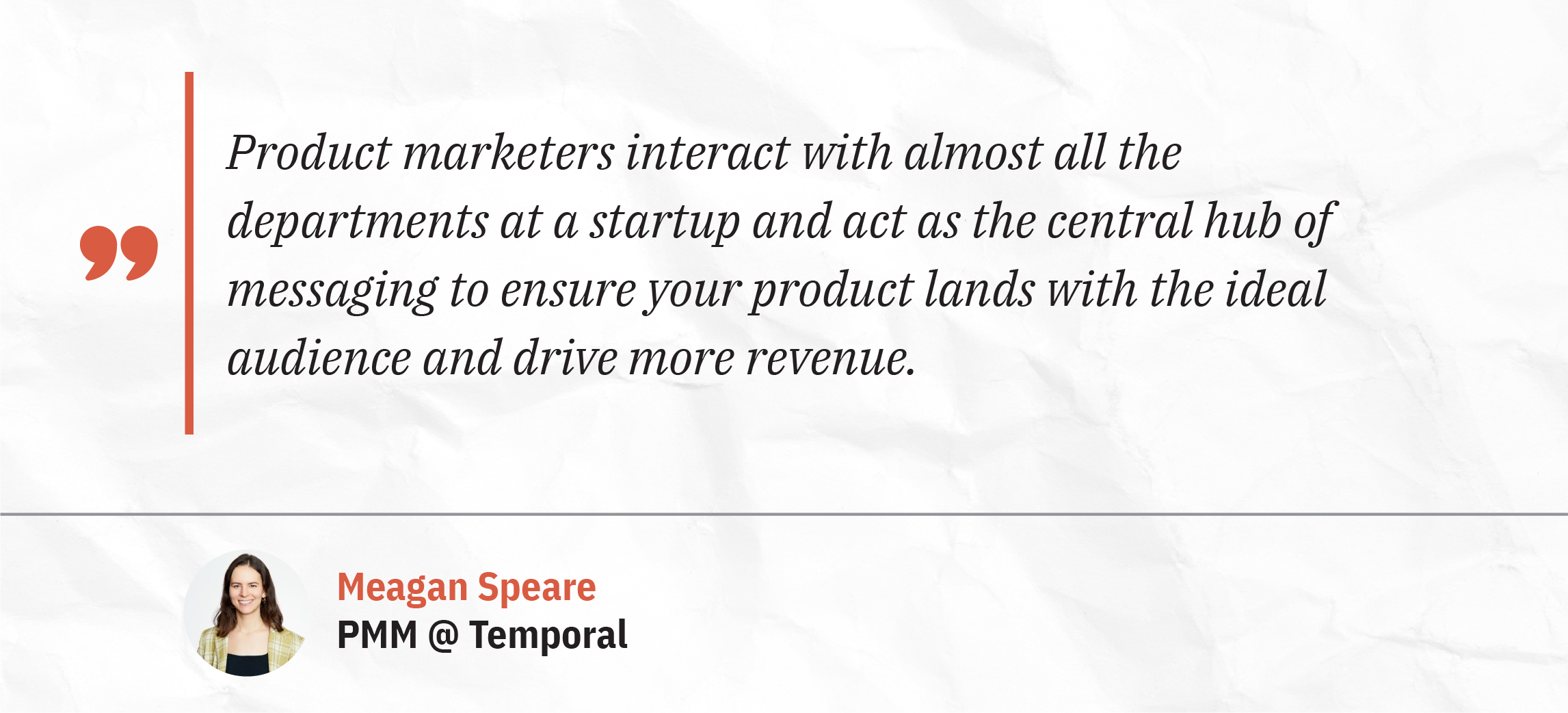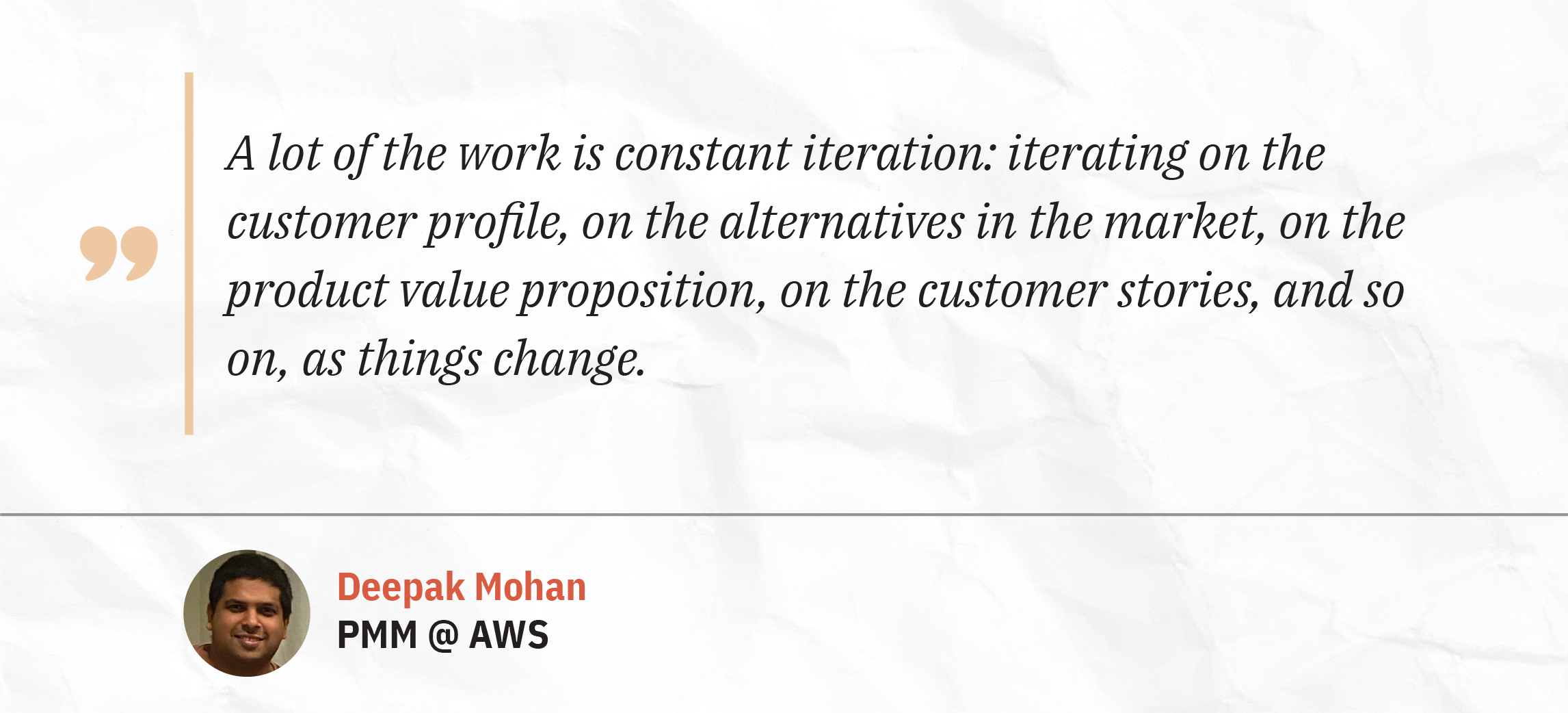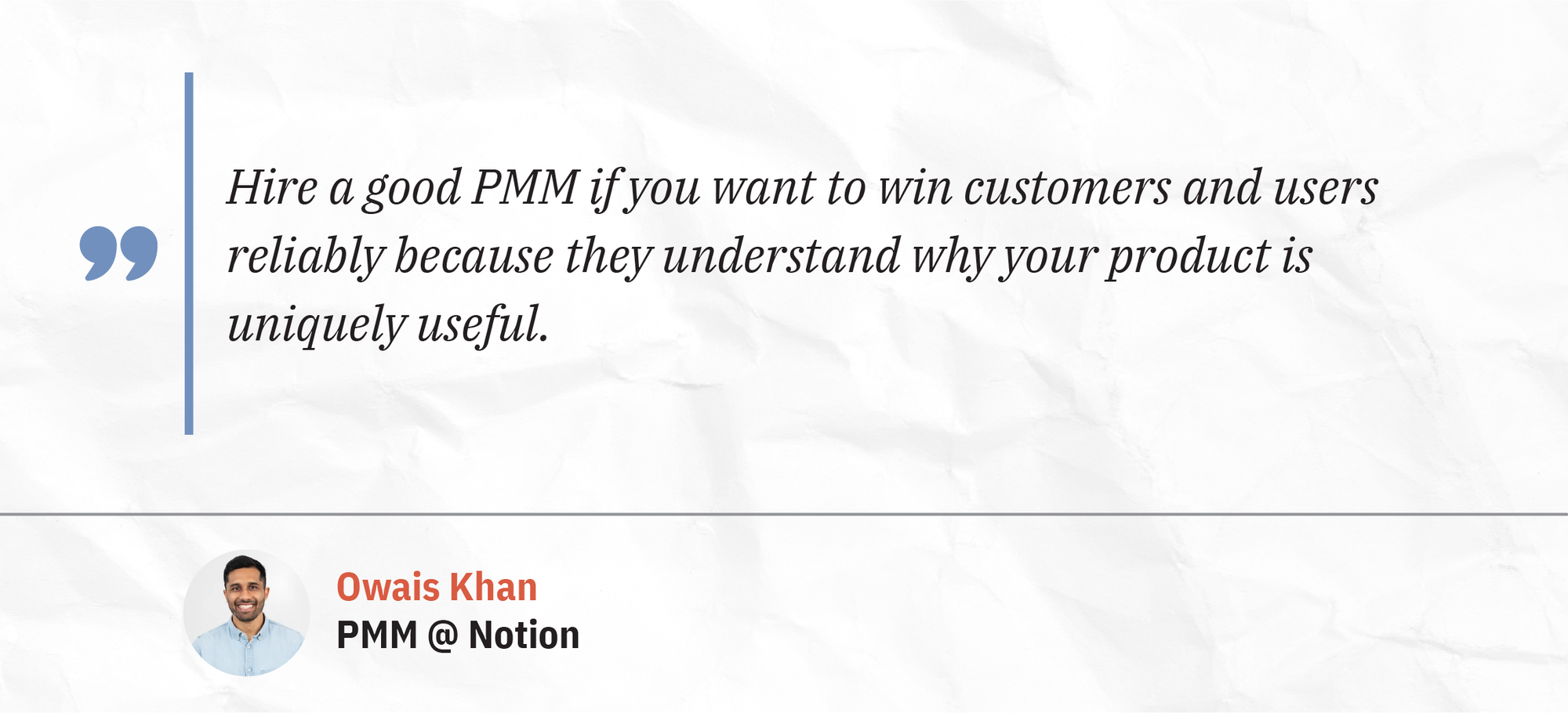There’s no shortage of blog posts out there explaining, many in great detail, what product marketing is. And yet, among the technical founders I work with, this function is still completely shrouded in mystery. What does a product marketer actually do? And why are you telling me that I need to hire one? Early stage product marketing seems about as clear as a winter sky in England.
A truism you often hear is that if you ask 3 different people what product marketing is, you’ll get 3 different answers. So I decided to do just that (N+1). I spoke to 4 different PMMs at technical companies and asked them a few questions:
- What is product marketing?
- What’s a day in the life of an early-stage PMM?
- Why should someone hire you?
The results will, hopefully, give you a little clarity.
What does a product marketer do?
Min Kim, PMM @ Stainless
Traditionally, PMM work is a balance across three buckets: product launches, sales enablement, and content creation. Depending on a bunch of factors — size of company, maturity of the GTM function, bandwidth, technicality of the product — this balance will remain pretty fluid. Personally, I think within the marketing function, the most important goal for a PMM is to drive pipeline. Because the role is so cross-functional, collaborating with product, engineering, sales, and all facets of marketing (demand gen, brand, field marketing, corporate marketing, PR, etc.), you usually have the best idea (you should at least) around how to launch certain products, use cases you are unlocking for target personas, ideal customer profiles you should go after, and how the product is differentiated against competitors.
So in theory, you should build effective go-to-market campaigns that generate excitement for users, generate more signups, create opportunities for sales, and hopefully win some big customers.
Owais Khan, PMM @ Notion
It’s a very noisy world and people have many products to pick from, especially in technical tools. A PMM’s sole purpose is to use product and GTM (channels, sales motion etc.) to win positioning in the market your company competes in. Winning positioning makes you the default choice in a potential user’s mind. That’s what it’s all about.
A PMM has to define the company’s unique positioning. They do this by talking to tons of users, learning from the current sales team, studying your ICP’s workflows today, researching other tools, going to sell to customers themselves, and a lot more.
The goal is to build deep intuition about why users are picking your product vs. others. Then turn that reason into the company’s overall positioning statement and messaging. Positioning and messaging informs the copywriting that shows up in the world for potential users via channels they interact with (e.g. Notion wins because it’s one connected workspace. Copywriting on changelogs, billboards, ads, emails, social is “notes, docs, wikis, calendar in one place”, “less open browser tabs”, “less searching for docs”).
How do you evaluate a good PMM?

Also, are they helping the product teams understand what they need to build to win the market? Do they focus on the smallest details like what to show in a demo video or in the subject line of an email? These all add up to the overall brand a user feels.
Deepak Mohan, PMM @ AWS
Every technology product has a number of exciting and interesting capabilities that it delivers to customers. Product marketing identifies the ones that most resonate with the target audience, and builds a product narrative that conveys these.
This product narrative is communicated then through multiple channels - including the product page on the web; ongoing content like blogs and whitepapers; event presence like booths; and in speaking opportunities like keynotes. While the core function is not writing the content for each of the individual channels, writing is integral to the function as it helps frame and reflect on the narrative, and iterate on the narrative to continuously align it with the target.
In early-stage companies or evolving companies, this function is also an active stakeholder in the evaluation and identification of the target customer (the ideal customer profile or ICP) for the product. Key to all of this is building a deep understanding of the product, the problem it solves, and the outcomes customers are trying to deliver.
Meagan Speare, PMM @ Temporal
At the most basic level, product marketing establishes the company’s and the product’s positioning and messaging. Why does this matter? Potential customers need to understand how the product solves their pain points and adds value to their lives in order to buy your product.
To establish positioning and messaging, product marketing does a fair amount of research and constant iteration, especially in the early stages of companies:
- Persona definition - who are your key personas and what’s your ideal customer profile?
- Category definition - what category should your product be part of?
- Competitive intel - who are your main competitors and what differentiates your product?
In practice, product marketing owns and influences many key deliverables of go-to-market:
- Marketing messaging (delivered via website, content, webinars, ads, etc)
- Sales enablement (sales collateral, pitch decks, product training)
- Product messaging (product and feature launches)
- Analyst relations (working with firms Gartner and Forrester to establish the company’s position in the market)

What’s a day in the life of an early stage PMM?
Min Kim, PMM @ Stainless
This is a pretty important thing to highlight. For an early-stage PMM, you will have to do everything. There is very little structure established, so I think it’s valuable to be willing to dive into everything, even into projects you don’t have relevant experience for. You will need to learn how to do some basic design work in Figma, get familiar with using GA4 and Hubspot, edit videos using Descript or Premiere, attend events and prospect customers.
This is a pretty important thing to highlight. For an early-stage PMM, you will have to do everything. There is very little structure established, so I think it’s valuable to be willing to dive into everything, even into streams of work you don’t have relevant experience for.
For example, these are some of the projects I can be working on in a single day:
- Launching new campaigns on LinkedIn
- Tweaking copy for reminder emails for a conference we’re hosting
- Coordinating/negotiating with different podcasts and newsletters channels for sponsored posts
- Writing copy and working with the design team on a new product page
- Creating social copy from past presentations that our engineers gave at other conferences
- Pulling reports in Google Analytics to understand which types of SEO content are driving the most traffic
- Interviewing customers for case studies
- Writing a thought leadership blog for product managers that explains what the b2b enterprise roadmap entails
Some thrive in this type of an environment, and some don’t. And I think especially in early stage startups, PMMs that have resilience, adaptability, and resourcefulness are the ones that do well.
Owais, PMM @ Notion
A PMM’s day to day highly depends on the stage of the company they’re working with. For very early stage startups, you might say their product is still being defined. Here’s what a PMM might be spending their time on:
- 5+ user interviews every week with specific personas to deeply understand the problem and why your product can solve it uniquely
- Defining how the product will be positioned and messaged (mocking up landing pages, launch emails etc.)
- Market research (downloading and using others tools, understanding what your target buyer really considers competitors to your product (usually it’s doing nothing or not wanting to migrate from their current tool)
- Adding detailed and useful feedback on eng or PM’s PRD draft or Figma mocks
- Attending brainstorms and weekly stand up meeting with eng team to define the features and product experience we need to win in the market
Once the product is a little more defined and you’ve got a semblance of product market fit, the day to day might change:
- Create a GTM plan that outlines the messaging, which channels we’ll prioritize for the launch, what the market looks like, what discovery questions the sales team should be asking, and more. The goal of a GTM plan is to bring together messaging with a clear execution strategy to bring it to life
- Weekly standups with eng on feature progress, which things won’t make it, and how that will impact the messaging
- Kickoff GTM threads and either own channels directly (e.g. draft the launch email, write social posts, create in-app modal copy) or work with channel owners (create paid ads, billboard strategy, press briefing kits, etc.)
Deepak, PMM @ AWS
A lot depends on the stage of the product and the team. At the early stage, a lot of the day is spent writing and refining/improving/correcting what the company and product are all about (positioning) based on inputs from various sources – early customers, internal teams, and leadership.

On a tactical basis, this usually involves a mix of:
- Writing and revising content (both internal and external), including blog drafts, positioning documents, and enablement assets
- Collaborating with product on the roadmap
- Collaborating with broader GTM teams like sales to understand status and gaps
- Planning for the next N weeks or months of launches and broader market events
- Speaking to customers to understand the outcomes they are excited about and developing success stories based on those
- Staying aware of the conversations in the market (usually through a mix of tech news from sources like TechCrunch, relevant Reddit channels, Hacker News, and a mix of companies and blogs most relevant to the space)
Meagan Speare, PMM @ Temporal
It really depends on the stage of the company and the makeup of the marketing, product, and sales teams. The best thing about being a product marketer is that every day is different! Startup product marketers are constantly juggling at least 50 different projects.
Your day is likely a mix of:
- Tactical work: you may be writing messaging, drafting blog posts, project managing a product launch, making slides for sales presentations, or diving into data to analyze how a marketing campaign performed.
- Strategic thinking: you play a key role in deciding what content should be delivered, how best to pitch the product, and so on, so you may be making larger decisions about the marketing and go-to-market strategy.
- Meetings: as a product marketer, you’re the connective tissue between marketing, sales, and product, so you sync with multiple people in a day to check in on how projects are progressing, brainstorm marketing tactics, and prioritize work.
When the company is particularly lean, product marketers often take on additional marketing work like content marketing, copywriting, customer marketing, or other projects until additional headcount is added.
Why should a technical founder hire their first PMM?
Min Kim, PMM @ Stainless
I think it’s about scaling. An effective PMM will be like dousing a stack of firewood with gasoline. They’ll accelerate how quickly and effectively you can reach end users and bring momentum to the business.
For technical products, I do think it’s extremely important to hire a PMM that can think and speak like a developer. It helps greatly if they have an engineering background, but if not, they should at least have a good sense of determining whether a piece of writing will pass the “sniff test” of a developer. It’s an audience that’s extremely wary of marketing fluff, so the ability to write in a way that’s authentic, accurate, and concise goes a long way.

Owais, PMM @ Notion
Hire a good PMM if you want to win customers and users reliably because they understand why your product is uniquely useful.
Make sure the PMM is a systematic thinker who can break down problems into component parts (not just copy paste playbooks from other companies). A good early stage PMM should act like an owner of the whole company, but understand their unique contribution will be building a GTM engine. Then give them enough autonomy and let them cook!

Meagan Speare, PMM @ Temporal
It’s important to hire a product marketer early when building your marketing team, because the right messaging creates an outsized impact on your business’s growth.
As with many first hires at a startup, you need someone who has a varied skill set to take on a wide scope of projects (“horizontal” rather than “vertical” expertise), and enjoys building from the ground up instead of just using existing frameworks and processes. For product marketing in particular, familiarity with the market in which your product operates (and the audience your product targets) is helpful—or in the absence of that, a proven ability to learn that information quickly.